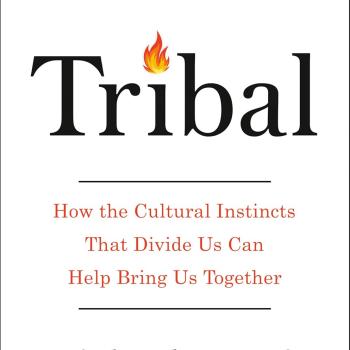Today’s post comes from guest writer, Matt Rhodes. This is Part 3 of a series where he introduces key ideas from his new book, which I enthusiastically endorsed. Having lived in North Africa since 2011, he and his wife, Kim, serve as part of a church planting team to a previously unengaged people group. Check out Part One and Part Two.
 The village of Korojaba was declared “open-defecation free.”
The village of Korojaba was declared “open-defecation free.”
I hope this won’t disturb you too much, but in parts of the world where there is no running water, many villagers simply walk out into the wilderness when they need to defecate. Where my wife and I work, just south of the Sahara, this creates a problem. When rains do come, water carries everything—everything—downhill into the wadis, seasonal rivers where people get their drinking water.
And people drink the water and get sick, and children die.
In the last several years, a number of non-profit organizations have come to the area where my wife and I live and tried to address this problem by encouraging people to dig pit toilets.
After the people in Korojaba reported that they had all dug pit toilets, the non-profit group that had “trained” them slaughtered a sheep, threw them a party, and reported back to its donors that disease and death would be significantly reduced in Korojaba.
Tales of Two Ministries
Non-profit groups come and go, but my wife and I live here. So, we know that just up the wadi from Korojaba, a number of children are living at a local Quranic school. And they have not been trained to dig pit toilets. We know that the people of Korojaba did not feel they could afford concrete to cover their pit toilets, and so they continue to defecate in the desert. We know that uncovered pits provide places for mosquitoes to breed, spreading malaria.

You cannot expect to succeed in development work if you do not know a people’s language and culture. You cannot expect to succeed if you do not have long-term, ongoing relationships with people that allow you to learn what is not working and to respond to the unique problems that arise in each location.
When I had just arrived on the mission field, senior members of our team appointed a group of elders. We were in a large North African city, and six men had been doing Bible study on and off with different missionaries. The missionaries who were working most closely with them did not know them very well and did not speak Arabic very well, but they decided that these men had demonstrated adequate maturity to plant and lead a church on their own.
My housemate at the time was a missionary who was applying himself to Arabic study as I was. He struck up a friendship with a local man who knew the six elders well. That man knew that the newly appointed elders had girls come over to their house on a regular basis. He was interested in learning about Jesus’s message—and later became a believer—but he refused to speak to the “elders” about it because their promiscuity had convinced him they weren’t spiritual men.
You can’t expect to plant stable churches if you do not know a people’s language and culture. You can’t expect to plant stable churches if you do not have long-term, ongoing relationships with people that allow you to learn what is not working and to respond to the unique problems that arise.
I place a church planting anecdote alongside an anecdote about secular development work above because part of our problem is that we tend to see missions and gospel ministry as being fundamentally different from other kinds of work. While ministry is unique in ways, God still works through Christians in ministry as He works in Christians in all professions, releasing the Spirit’s power, in large part, through their faithfulness in human, humdrum, professional duties.
Let me explain.
If you choose a mechanic to work on your car—or a dentist to work on your teeth or a doctor on your heart or a counselor on your marriage, you’ll expect them to fulfill every day professional responsibilities, diligently studying their trade, applying what they learn through good, common-sense wisdom, and sticking with the task till it’s finished. You want them to do good, professional work because if they don’t, the consequences may be devastating for you.
The Gospel is for Everyday Ministry
Perhaps the same is true for the work of gospel proclamation.
Perhaps the lively, energetic work of the Spirit happens within and alongside a set of everyday, human responsibilities, and perhaps those who attempt to channel the Spirit’s power without taking these responsibilities seriously can hurt others. At home, for example, the pastor who does not take time to search the scriptures can damage the marriage he is counseling. Or can mislead the congregation he preaches to. On the other hand, a pastor who discharges these duties carefully can expect the Spirit to move in his diligence.
Past generations of missionaries believed that their training in the Scriptures—until they knew them deeply and profoundly—was needed. It was a “means” of grace, offered to God for the Spirit to move in. The long years that they spent in language learning—until they could interact freely and appropriately in any situation—were a means of grace. The years that they spent discipling and teaching church elders were a means of grace.
I don’t want to berate missionaries who have neglected these activities. I want to breathe wind into their sails. I want to inspire them to pursue vocational holiness, to say, just like your supporters do at home, you can and should excel in your vocation.
You don’t have to imagine your day-to-day work is largely useless as you pray for God to lead people to Him. God’s answers to prayer do not bring His kingdom apart from our everyday life and work. They help us to glorify Him in our life and work.
But my primary concern here is not for missionaries. It’s for the lost. Sadly, I believe our effectiveness in reaching them has been damaged by our inattention to excellence in our work. That will be the subject of my next post in this series.
Top Photo Credit: Flickr/utenriksdept, CC 2.0












